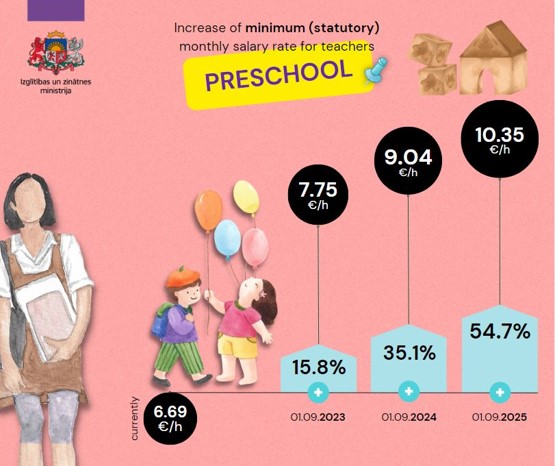Address
State Education Development Agency
1, Vaļņu Street
LV-1050 Riga
Valsts izglītības attīstības aģentūra
Valnu iela 1
LV-1050 Rīga
Tel: +371 67 830 837
E-Mail: eurydice@viaa.gov.lv
Website
2024
As of January 1, teachers' salaries are increasing
From January 1, 2024, the minimum salary rate for preschool teachers it will increase by 23%, equalizing it with the lowest monthly salary rate for other general education teachers.
To ensure high-quality and high-quality education, while continuing to increase the salary of teachers, the Ministry of Education and Science has prepared a conceptually new model of financing teachers' salaries. The minimum hourly salary rate for preschool teachers will increase from the current 7.75 euros or 1240 euros per month to 9.54 euros, which is 23.1% more than before, reaching 1526 euros per month for a 40-hour work week.
The lowest monthly salary rates for heads of general education institutions, as well as educational methodologists, are also increased.
2023
Increasing the minimum hourly rate and harmonizing the workload for preschool teachers
Amendments to the Regulations on Teachers' Work Remuneration provide for an increase in the minimum salary rate for preschool teachers. The amendments were approved with the aim of balancing the workload and remuneration of teachers at all levels of education, as well as increasing the lowest monthly salary rate for teachers of preschool institutions. Starting from September 1, 2023, the workload composition for preschool teachers is determined, which provides for 34 hours for teaching and 6 hours for performing other duties (4 hours in 2022).

2022
Strategic planning for early childhood support
In December 2022, the Government adopted the Child, Youth and Family Development Guidelines. The guidelines cover several topical, horizontal, and cross-sector development directions in children, youth, and family policy, such as strengthening the need for early childhood policy, ensuring the development needs of children and young people, creating an early preventive support system, health, education, psychological and emotional well-being.
Critically important are the first three years of a child's life, when the child's development occurs most rapidly. Providing support during this period can have a positive impact throughout the rest of a person's life. Evidence also shows that effective early intervention is critical and can improve a child's life chances at any stage of childhood or adolescence.
In Latvia, it is planned to create and provide a comprehensive range of preventive support services by 2027. It envisages the introduction of parenting skills programs, including providing support to expectant parents and prioritizing very young parents without family support, as well as supporting parents who experience postpartum depression after the birth of a child or have difficulties in forming an emotional attachment to a child. When creating the early preventive support system, it is planned to adapt and implement in Latvia several prevention and early intervention programmes that have already been proven in global practice, such as Incredible Years, Nurse-Family Partnership, Early Birds, KiVa, Cool Kids.
One of the cross-cutting tasks of the strategy is to develop flexible ways of exchanging information and decisions between inter-sectoral and inter-institutional specialists, management and cooperation algorithms for multi-professional coordination of children's cases, which should be equally applicable to the entire broad field of ensuring children's rights as a whole, starting with early (preventive) detection of developmental risks, early preventive support for all children, as well as the field of protection of children's rights.
